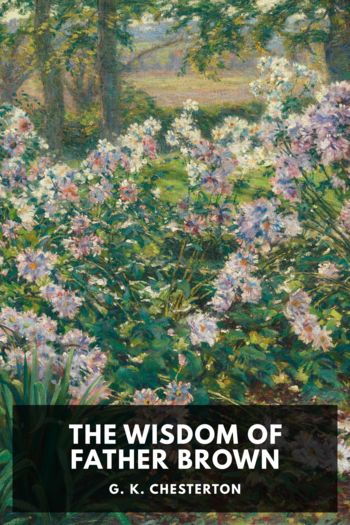The Wisdom of Father Brown - G. K. Chesterton (read full novel .txt) 📗

- Author: G. K. Chesterton
Book online «The Wisdom of Father Brown - G. K. Chesterton (read full novel .txt) 📗». Author G. K. Chesterton
“By the way, Malvoli—” Pooley began.
“Malvoli,” said the priest, “has nothing to do with it. I dare say he has some Italians with him, but our amiable friends are not Italians. They are octoroons and African half-bloods of various shades, but I fear we English think all foreigners are much the same so long as they are dark and dirty. Also,” he added, with a smile, “I fear the English decline to draw any fine distinction between the moral character produced by my religion and that which blooms out of Voodoo.”
The blaze of the spring season had burst upon Seawood, littering its foreshore with famines and bathing-machines, with nomadic preachers and nigger minstrels, before the two friends saw it again, and long before the storm of pursuit after the strange secret society had died away. Almost on every hand the secret of their purpose perished with them. The man of the hotel was found drifting dead on the sea like so much seaweed; his right eye was closed in peace, but his left eye was wide open, and glistened like glass in the moon. Nigger Ned had been overtaken a mile or two away, and murdered three policemen with his closed left hand. The remaining officer was surprised—nay, pained—and the negro got away. But this was enough to set all the English papers in a flame, and for a month or two the main purpose of the British Empire was to prevent the buck nigger (who was so in both senses) escaping by any English port. Persons of a figure remotely reconcilable with his were subjected to quite extraordinary inquisitions, made to scrub their faces before going on board ship, as if each white complexion were made up like a mask, of greasepaint. Every negro in England was put under special regulations and made to report himself; the outgoing ships would no more have taken a nigger than a basilisk. For people had found out how fearful and vast and silent was the force of the savage secret society, and by the time Flambeau and Father Brown were leaning on the parade parapet in April, the Black Man meant in England almost what he once meant in Scotland.
“He must be still in England,” observed Flambeau, “and horridly well hidden, too. They must have found him at the ports if he had only whitened his face.”
“You see, he is really a clever man,” said Father Brown apologetically. “And I’m sure he wouldn’t whiten his face.”
“Well, but what would he do?”
“I think,” said Father Brown, “he would blacken his face.”
Flambeau, leaning motionless on the parapet, laughed and said: “My dear fellow!”
Father Brown, also leaning motionless on the parapet, moved one finger for an instant into the direction of the soot-masked niggers singing on the sands.
The Salad of Colonel CrayFather Brown was walking home from Mass on a white weird morning when the mists were slowly lifting—one of those mornings when the very element of light appears as something mysterious and new. The scattered trees outlined themselves more and more out of the vapour, as if they were first drawn in grey chalk and then in charcoal. At yet more distant intervals appeared the houses upon the broken fringe of the suburb; their outlines became clearer and clearer until he recognized many in which he had chance acquaintances, and many more the names of whose owners he knew. But all the windows and doors were sealed; none of the people were of the sort that would be up at such a time, or still less on such an errand. But as he passed under the shadow of one handsome villa with verandas and wide ornate gardens, he heard a noise that made him almost involuntarily stop. It was the unmistakable noise of a pistol or carbine or some light firearm discharged; but it was not this that puzzled him most. The first full noise was immediately followed by a series of fainter noises—as he counted them, about six. He supposed it must be the echo; but the odd thing was that the echo was not in the least like the original sound. It was not like anything else that he could think of; the three things nearest to it seemed to be the noise made by siphons of soda-water, one of the many noises made by an animal, and the noise made by a person attempting to conceal laughter. None of which seemed to make much sense.
Father Brown was made of two men. There was a man of action, who was as modest as a primrose and as punctual as a clock; who went his small round of duties and never dreamed of altering it. There was also a man of reflection, who was much simpler but much stronger, who could not easily be stopped; whose thought was always (in the only intelligent sense of the words) free thought. He could not help, even unconsciously, asking himself all the questions that there were to be asked, and answering as many of them as he could; all that went on like his breathing or circulation. But he never





Comments (0)